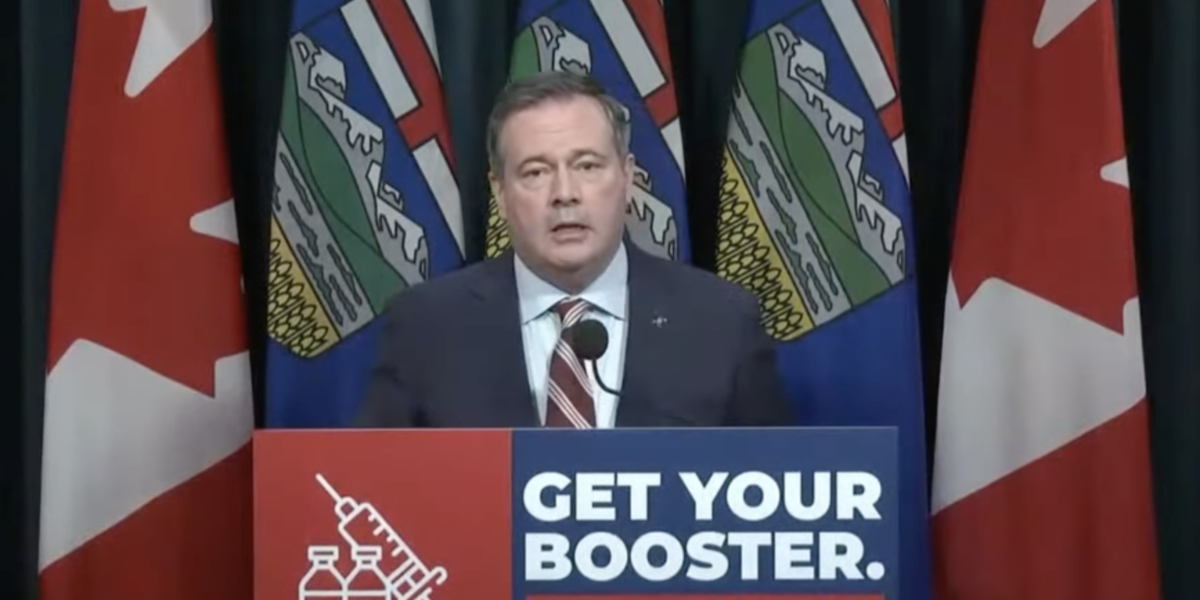There was little informative or edifying about the mostly successful effort by Premier Jason Kenney and three of his senior health care enablers to run out the clock on reporters’ questions at Thursday’s COVID-19 news conference.
Facing not only the potential for difficult questions about the chaos in Alberta’s schools and hospitals driven by spread of the highly infectious Omicron strain of the virus, but the danger of embarrassing interrogation about the Madu Snafu, the premier adopted a manipulative approach to journalists.
The first hour of the news conference, observed Mount Royal University political scientist Duane Bratt, who has a talent for pithily summing up such behaviour, was “a filibuster.”
The goal of the filibuster, obviously, was to limit the time available for reporters to ask questions, especially about the continuing uproar over Justice Minister Kaycee Madu’s notorious call to Edmonton’s police chief about his traffic ticket last March.
By having Health Minister Jason Copping (appearing from home in light of his recent positive COVID test), Chief Medical Officer of Health Deena Hinshaw, and Alberta Health Services CEO Vera Yiu help him extemporize repetitively and uninformatively via video for close to a full hour, Kenney was able to limit the Q&A portion of the news conference to two questions each from just six reporters.
And, as Bratt observed, since one was from a right-wing news outfit and lobbed Kenney a softball about Quebec, allowing him the opportunity to rant at length, and the other, in French, was the same as an earlier one in English, there were really only four.
As veteran Alberta political reporter Graham Thomson said on Twitter, “the gov’t has used the pandemic to restrict the ability of journos to hold (it) to account on many issues including, ironically, the pandemic.”
Five of the reporters selected asked questions about COVID, and one asked the money question about Kenney’s role in the Madu affair – to wit, What did you know and when did you know it?
But thanks to the tightly controlled format of the COVID-constrained conference, it was easy for Kenney to bat it away with his trademark glib gaslighting.
“I do recall at some point last year hearing that Minister Madu had gotten a ticket, had paid for it,” Kenney said, as if it were the last thing on his mind. “I got fully briefed on all of this, including about the call and the details, on Monday afternoon following media inquiries.”
So those in political circles who are insisting it was the premier who demanded hours after the call that Madu pay the ticket and drop the matter will have no choice but to accept the premier’s account. Indeed, journalists by tradition aren’t even supposed to mention such suggestions without supporting documentation.
However Madu came up with the idea, that strategy has not paid off for him.
Beyond that short-lived moment of frisson, the most striking aspect of the news conference was the gap between the premier’s characteristic optimism about the progress of the pandemic, and Yiu’s rather bleaker assessment.
“If the variant performs in Alberta like it has in jurisdictions all around the world, we can reasonably expect that we may now be beginning on the down-slope of transmission,” the premier cheerfully asserted.
“It’s reasonable to infer that we are at or recently past the peak of infections,” he said later in response to a reporter’s question. “We can, I think, expect to see, as other jurisdictions have, a relatively low, a significantly lower, impact on Intensive Care than earlier variants.”
In fairness, Kenney offered some qualifiers, and didn’t quite promise us the best summer ever.
Yiu, possibly hampered by an instinct to take questions seriously and provide straightforward answers, was not as optimistic.
“In the past week we have seen hospitalization numbers increase sharply,” she said. “This week we reached numbers of total hospitalizations with COVID that is higher than at any point during the pandemic.
“We are not necessarily seeing a spike in the very ill as we did in the fall, but we are seeing a surge in people who may not need ICU care but do need support in Emergency Departments, or in the hospital,” she added. “Our ICU teams can expect to see more patients needing their care in the coming weeks.”
Hinshaw said 3,527 new cases of COVID-19 have been identified, the positivity rate is now 33 per cent, and there have been eight new deaths. A total 1,131 people were being treated for COVID in Alberta hospitals as of yesterday, surpassing the fourth wave peak of 1,128 last September. There are 108 patients in ICU.
Where are Canada’s fierce infrastructure defenders now that truckers are ‘slow-rolling’?
Who can forget the Conservative hysteria that surrounded the rail blockades two years ago in support of the Wet’suwet’en First Nation’s opposition to the Coastal GasLink Pipeline project running through its ancestral territory in British Columbia?
Conservative leaders were everywhere, assailing the Trudeau Government for being too soft on the protesters and demanding “national leadership to ensure that Canada is a country characterized by the rule of law,” as Premier Kenney put it.
If nothing was done, they warned repeatedly, the Canadian economy would soon be on its knees.
The United Conservative Party brought in the draconian and almost certainly unconstitutional Critical Infrastructure Act, supposedly in response to the blockades.
Now vaccine-resistant truckers across Canada are threatening slow-rolling blockades of critical infrastructure like highways and city streets to protest the appalling thought they might be required to have a COVID-19 vaccine before going to and fro across the Canada-U.S. border. Quelle horreur!
And yet, other than whining about how Ottawa had no business bringing in the vaccine mandate, there was nary a word from the usual suspects on the right about the threat to our critical infrastructure or the economy imposed by the rebel truckers.
From Jason Kenney, there was not even a hint he’d contemplate using Alberta’s Critical Infrastructure Act. Whatever could the reason be?




